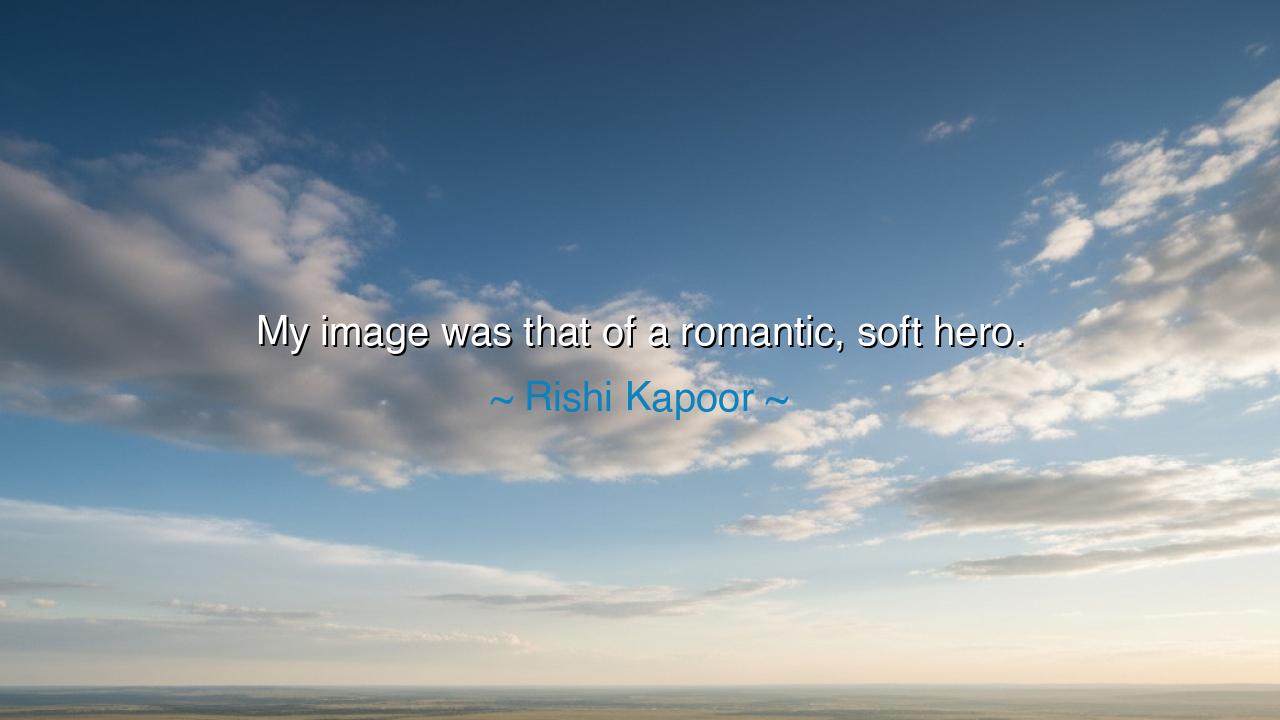
My image was that of a romantic, soft hero.






Hear the words of Rishi Kapoor, who reflected upon his life in cinema with the confession: “My image was that of a romantic, soft hero.” These words are not merely about roles on a screen, but about the shaping of identity, the weight of expectation, and the way the world remembers us. To be called a romantic hero is to be seen as one who embodies love, tenderness, and gentleness, and yet it is also to be bound by that very image, no matter how many other shades lie within the soul.
Kapoor, born into the great dynasty of Indian film, first rose to prominence in the 1970s, when Hindi cinema longed for tales of love, music, and innocence. His debut as a leading man in Bobby cast him forever in the mold of the romantic hero, the gentle youth whose eyes spoke of longing and whose heart was tender. In an age of upheaval, when India was wrestling with its own struggles, such heroes brought comfort. They embodied dreams of purity, love untainted, and the hope of happy endings. Thus, Kapoor became not only an actor but a symbol, one who carried the desires of millions in the softness of his on-screen presence.
Yet to live as a soft hero is a double-edged gift. For while audiences adored him in these roles, they also confined him to them. The rugged, the dark, the conflicted—these were often denied to him, as if the world could not imagine that behind the tender gaze there might also be steel. This is the truth of all who become icons: the very image that gives fame also builds a prison. To be known for gentleness is noble, yet it may eclipse the fullness of a man’s being. Kapoor’s words echo with the awareness of this paradox: celebrated, yet limited, cherished, yet confined.
History is filled with such figures. Consider Sir Philip Sidney, the English poet-soldier of the sixteenth century. Known for his sonnets and his romantic ideals, he was adored as the symbol of chivalry and tender passion. Yet he died upon the battlefield, a warrior’s death, showing that within the romantic heart also beat courage and iron. So too with Kapoor: the romantic, soft hero was real, but it was only one face of the man, one thread of a richer tapestry.
The meaning of this quote is not merely about cinema, but about human life. We are all, at times, cast into roles—by family, by society, by destiny. Some are called strong, some tender, some wise, some foolish. Yet none of us is only one thing. Kapoor reminds us that the image others see is only a fragment, never the whole. A man may be gentle yet fierce, soft yet unyielding, romantic yet realistic. To accept the role we are given without letting it consume us is one of life’s greatest challenges.
The lesson is clear: do not let the world’s image of you be the only truth. Honor it, for it may carry beauty, but remember that you are greater than any single role. The romantic hero may live within you, but so too does the fighter, the thinker, the dreamer, the wanderer. Refuse to be diminished by the labels of others, however flattering they may be. Life demands the courage to live beyond the image.
Therefore, children of tomorrow, take Rishi Kapoor’s words as a beacon. If the world sees you as soft, know that you can also be strong. If they see you as romantic, know that you can also be wise. If they place you in one box, rise and show them you cannot be contained. For your true self is not a single role, but the full drama of existence, vast and infinite.
Thus, Kapoor’s reflection becomes timeless: we are all, in some way, given an “image” by the world—but the task of the soul is to live beyond it, and to prove that within every romantic, soft hero lies a deeper, greater story still waiting to be told.






AAdministratorAdministrator
Welcome, honored guests. Please leave a comment, we will respond soon